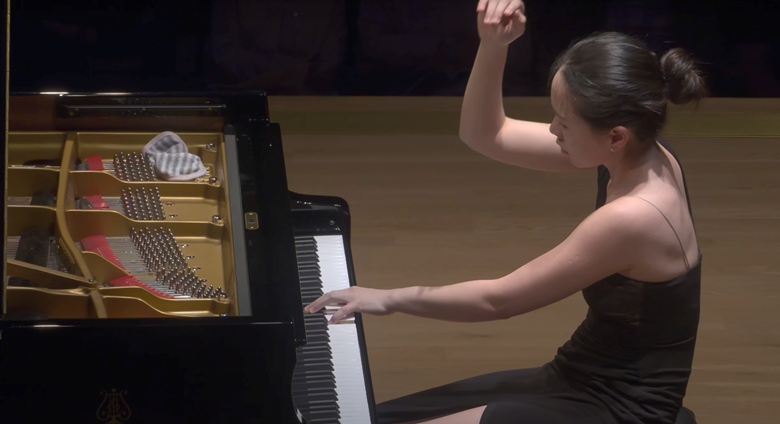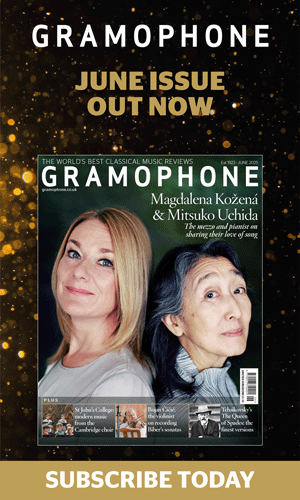Jed Distler's Cliburn Blog No 5: Getting serious with some heavy-hitters
Jed Distler
Monday, May 26, 2025
'The freedom and sheer fun that Chaeyoung Park conveyed in Brahms’s Paganini Variations, Book 2, almost made me forget about her effortless technical mastery'

Perusing the repertoire offerings for Saturday evening’s Quarter-final concert and Sunday’s marathon of Quarter-final concerts, it was clear that the candidates are getting serious. For example, one has to be crazy or supremely confident to devote an entire Quarter-final recital to the longest and most difficult of Beethoven’s 32 piano sonatas. However, Aristo Sham is a card-carrying risk taker, and choosing to play Beethoven’s ‘Hammerklavier’ at a relatively early junction in this competition is tantamount to ascending Mount Everest without supplementary oxygen. Happily, he got to the summit in one piece.
Some pianists navigate the opening’s single note upbeat leap to the downbeat chord with two hands to ensure accuracy, as in video performances with Wilhelm Kempff and Stephen Kovacevich. However, Beethoven notates the leap on one staff, which might imply that he wants it executed with one hand. Aristo Sham does so, although he slightly elongates the bass note upbeat as a quarter note, probably for safety purposes. If he didn’t broach Beethoven’s overly optimistic first-movement metronome marking, the expressive economy of his energetic, forthright and textually honest interpretation hit home. For the record, Sham opted for the ‘inspired misprint’ A sharp instead of the ‘correct’ though less interesting A-natural in bars 224-226. His Scherzo was a bit square and stiff, although he unleashed a furious upward F major scale at the end of the Trio. In the Adagio, Sham’s surface cool gave way to more nuance and inflection. The pianist saved his best playing for the fourth movement. His wonderful timing of the introductory Largo’s start/stop gestures led into a zippy, upbeat and exciting Fugue. Unlike most pianists who get thicker and slower as they progress, Sham maintained his basic tempo and effectively flinty textures.
Watch Aristo Sham's performance:
Overall, Angel Stanislav Wang gave a better account of himself here than in the Preliminaries. Personally I’d never begin a recital with an obvious concert closer like Ravel’s La valse, where Wang assuredly dispatched Ravel’s thousands of notes, showing off his whiplash octave technique in the process. But the music’s requisite joy and abandon eluded him. The best La valse from the Cliburn remains a 2005 Preliminary performance when our 2025 Cliburn livestream host Elizabeth Joy Roe played the bejesus out of it (you can find this performance on all major streaming platforms).
Out of Wang’s selection of four Debussy Preludes, I liked the snappy accents of ‘La sérénade interrompue’ and the dry-ice runs and flourishes of ‘Feux d’artifice’. Although personally I find Guido Agosti’s Stravinsky Firebird transcription tedious and awkwardly scored, I must concede its popularity among competition pianists. Wang’s technical brilliance and imaginative tonal application held my attention and thrilled the audience.
Angel Stanislav Wang:
In my 2022 Gramophone Cliburn Blog, I wrote about my one and only encounter with Van Cliburn in the flesh. He told me he’d give anything to hear a recording of the Taneyev Prelude and Fugue in G sharp minor from his 1958 Moscow Tchaikovsky Competition performance. Could I find a copy? I promised I’d look around. 34 years later and I’m still looking!
However, Cliburn would loved Philipp Lynov’s inspired and lovingly idiomatic Quarter-final performance of the Taneyev, fueled by this young contender’s marble sonority and smart tempo choices that propelled the music forwards without sacrificing a singing impulse. Russian pianists seem to have a special affinity for and understanding of Schumann’s volatile First Sonata – think of Emil Gilels and Vladimir Sofronitsky. They managed to reconcile the music’s wildly discursive and achingly tender opposites. So did Lynov in every bar of all four movements.
Philipp Lynov:
Jonas Aumiller initiated Sunday’s long Quarter-final day. The cresting left-hand arpeggio waves in Liszt’s ‘St François de Paule marchant sur les flots’ were clearly calibrated rather than stormy. Judging Aumiller in last year’s Rina Salo Gallo Competition, I critiqued his racing through the climax of ‘Feux d’artifice’, and he still plays it more like Boulez than Debussy. However, his Beethoven Op 111 has ripened since that competition, from the first-movement introduction’s concentrated dynamic gradations to his carefully considered tempos and tempo relationships in the Arietta.
Jonas Aumiller:
In the following set, Mikhail Kambarov explored the Arietta more for pianistic effect, experimenting with voicings and expressive gestures, yet somehow holding it all together. Messiaen’s ‘Le baiser de L’Enfant Jésus’ conveyed a Lisztian glitter than differs from the stained-glass austerity typical of Yvonne Loriod and her students.
Mikhail Kambarov:
I doubt anyone would automatically link up Debussy’s Pour le piano, Respighi’s Six Piano Pieces and Prokofiev’s Third Sonata, yet leave it to Piotr Alexewicz to make such an unusual programme work. In the Debussy, he sculpted the opening Prelude in broad Brahmsian brushstrokes, probed the Sarabande to a fault and imbued every phrase throughout the Toccata with a different colour. Respighi’s late-Romantic style suits Alexewicz’s poetic persona, and perhaps his heartfelt performances will draw newfound attention to these keyboard rarities. In context of such colourful pianism, Alexewicz’s Prokofiev Sonata No 3 sounded surprisingly harsh and monochrome, at least via the livestream.
Piotr Alexewicz:
Alice Burla closed the morning’s first group of four Quarter-final presentations. She impressed me more today than in the Preliminaries. Both laser-like focus and unfettered freedom characterised her harmonically potent reading of CPE Bach’s G minor Sonata. My taste leans towards less rubato in Fauré’s Nocturne No 6 than Burla doled out, but it never breaks the line in her interpretation. Szymanowski’s Variations on a Polish Folk Theme, Op 10, brought out Burla’s freshest and most individual playing so far in the Cliburn, replete with sophisticated balances and ear-catching textural diversity.
Alice Burla:
An overwhelming parade of major heavy-hitting repertoire choices – as well as heavy-hitting performances – dominated the afternoon and evening Quarter-final recitals. Yanjun Chen seemed less inspired today than in her Preliminary round recital. Her studied and regimented Mozart C major Sonata, K330, didn’t sing, while her mellifluously shaded Debussy Preludes (‘Ondine’ and ‘Ce qu’a vu le vent d’ouest’) lacked characterful contrasts. Perhaps Chen was saving her resources for Medtner’s Sonata tragica, where she went for broke in the complex climaxes and triumphed.
Yanjun Chen:
In Mozart’s B minor Adagio, K540, Jonathan Mamora’s playing had what Chen’s Mozart lacked: a genuinely operatic impulse and a true sense of how to make phrases breathe. I never would have thought of this piece as an ideal curtain raiser for Liszt’s B minor Sonata, but this was brilliant programming on Mamora’s part. Throughout his entire performance of the Liszt, Mamora conveyed maturity, breadth and the feeling that he was truly listening to himself, and not playing for effect, although he unleashes plenty of power in the octaves. Perhaps that last ounce of audacity and bravura typifying the best renditions of the Liszt Sonata was missing, but considering the pressure of playing for a jury and millions of listeners around the world, I’m happy to cut Mamora some slack.
Jonathan Mamora:
Evren Ozel was on fine form in Bartók’s Out of Doors Suite, which especially impressed in the gorgeously atmospheric ‘Barcarolla’ and ‘Night Music’ movements. He resisted turning ‘The Chase’ finale into an Olympic sprint, opting for a sensible tempo that allowed the textural strands and polyrhythms to register. However, Schumann’s Humoreske, brought forth the best playing I’ve heard from Ozel so far. I loved the pianist’s floating transparency and shapely stepwise bass lines in the introduction, while his supple and brilliantly controlled fast tempos elsewhere minimised this composition’s sprawling tendencies and consistently moved the music forwards and upwards. I look forward to revisiting this bracing performance in the future.
Evren Ozel:
Chaeyoung Park arrived for her Quarter-final set fully prepared and, as we Americans say, loaded for bear. Her extraordinary stamina and concentration left me gobsmacked. Fine as Angel Stanislav Wang’s Agosti Firebird transcription was earlier, Park began where he left off; her fastidious textural contouring and orchestrally oriented detailing were in a class of their own. To clear the palette, perhaps, Park next played Debussy’s Prelude ‘Général Lavine – eccentric’, which had just the right cakewalking lope. In contrast to the Lisztian glitter of Mikhail Kambarov’s Quarter-final reading of Messiaen’s ‘Le baiser de L’Enfant Jésus’, Park’s controlled balancing of the chordal thematic material and that right-hand decorative elements dug deeper, more patiently and more rewardingly into the composer’s spiritual and sonic aesthetic. The freedom and sheer fun that Park conveyed in Brahms’s Paganini Variations, Book 2, almost made me forget about her effortless technical mastery. However Park fares going forward in The Cliburn, we’re reckoning with a world-class artist on every level.
Chaeyoung Park:
Elia Cecino was first to play in the evening. Some pundits may find his Haydn E minor Sonata too personalised and Romantically inflected, but the genuine musical impulse and sincerity I’ve always admired in this pianist enlivened the music in a convincing and enjoyable way. Similar words apply to the insidious transitions and imaginative phrasings throughout Mendelssohn’s Variations sérieuses. Scriabin’s Third Sonata may be Cecino’s calling card, having included it in numerous competitions and on his excellent debut solo recording on Suonare Records. As revealed in his Cliburn performance, Cecino’s interpretation has grown more dynamic and intense over time, with a finale that ecstatically bursts at the seams yet never lapses into chaos. Hot stuff, indeed!
Elia Cecino:
While much of Yangrui Cai’s pianism leaves me cold, he certainly knows what he wants, and commands the technical wherewithal and powers of projection to smash all barriers between ideation and execution. His relentless tension-filled Scriabin B minor Fantasy was a case in point. He conveys fluid flexibility in the long introspective sequences of Liszt’s ‘Bénédiction de Dieu dans la solitude’, which can sound endless in the wrong hands. His steely precision and lean sonorities in Stravinsky’s Three Movements from Pétrouchka reminded me of Alexis Weissenberg’s famous filmed performance and subsequent studio recording. In other words, I respected Cai’s Petrouchka more than I enjoyed it.
Yangrui Cai:
To close the evening, Vitaly Starikov gave Mozart’s seldom-heard Allegro in B flat major, K400, a delightfully exuberant workout. By contrast, he fashioned curvy rainbows from the pools of glorious arpeggios in Liszt’s ‘Les jeux d’eaux à la Villa d’Este’. Only his concluding Schumann Études symphoniques slightly disappointed with occasional fussy dynamic dips and superfluous accents.
Vitaly Starikov:
About 40 minutes later jury chairman Paul Lewis announced the 12 semi-finalists. Starting on Wendesday, May 28, we’ll be hearing a 60-minute recital and a Mozart concerto from the remaining contestants.
Piotr Alexewicz, Poland, age 25
Jonas Aumiller, Germany, 26
Yangrui Cai, China, 24
Elia Cecino, Italy, 23
Yanjun Chen, China, 23
Carter Johnson, Canada/United States, 28
Philipp Lynov, Russia, 26
Evren Ozel, United States, 26
Chaeyoung Park, South Korea, 27
Aristo Sham, Hong Kong China, 29
Vitaly Starikov, Israel/Russia, 30
Angel Stanislav Wang, United States, 22
Gramophone is a Media Partner of The Cliburn International Piano Competition












